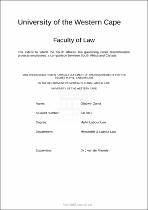| dc.contributor.advisor | Van De Rheede, Jeannine | |
| dc.contributor.author | Zuma, Gladwin | |
| dc.date.accessioned | 2022-08-11T07:39:28Z | |
| dc.date.available | 2022-08-11T07:39:28Z | |
| dc.date.issued | 2022 | |
| dc.identifier.uri | http://hdl.handle.net/11394/9232 | |
| dc.description | Magister Legum - LLM | en_US |
| dc.description.abstract | During apartheid the lives of black South Africans were dominated by unfair
discrimination on the ground of race. The creation of a new deracialised South Africa
began with the dismantling of the legislation that existed during apartheid that
promoted racial segregation and the promulgation of the Constitution. Section 9 of the
Constitution promotes equality and prohibits unfair discrimination. The Employment
Equity Act 55 of 1998 was enacted to give effect to section 9 (2) and 9 (4) of the
Constitution. In terms of section 6 (1) of the EEA ‘no person may unfairly discriminate
against an employee on various grounds which includes the ground of race’. | en_US |
| dc.language.iso | en | en_US |
| dc.publisher | University of the Western Cape | en_US |
| dc.subject | Affirmative action | en_US |
| dc.subject | Black people | en_US |
| dc.subject | Constitution of the Republic of South Africa | en_US |
| dc.subject | Employment Equity Act 55 of 1998 | en_US |
| dc.subject | Racial discrimination | en_US |
| dc.subject | South Africa | en_US |
| dc.title | The extent to which the South African law governing racial discrimination protects employees: A comparison between South Africa and Canada | en_US |
| dc.rights.holder | University of the Western Cape | en_US |

